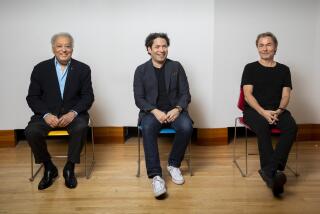JAZZ REVIEW : NEW FRANKS DROWNS IN LARGE SEA OF WATTS
- Share via
Time was, back in the late 1970s, when Michael Franks was composing his imaginative melodies and writing reasonably sophisticated lyrics, backed at times by an easy Latin beat, sometimes using a section of flutes or strings or horns, that he acquired a vast following on records and an intelligent audience.
Any of those early fans who visited the Universal Amphitheatre on Saturday or Sunday must have gone home with a bad case of shattered illusions. Where was the finesse, the subtlety of yesteryear? For the most part it was gone with the windstorm. During much of his very long and enthusiastically received set, Franks seemed to have sold his soul for a mess of wattage.
A powerful six-piece band with only one horn--Bill Evans, the former Miles Davis saxophonist--succeeded in rendering many of Franks’ words indecipherable. Though he sang songs from several of his early albums such as “The Art Of Tea” and “Tiger In The Rain” he managed, in effect, to self-destruct. Universal City became Ear Plug City.
A few numbers were dealt with more decorously, notably “Rainy Night In Tokyo” (with Evans switching to flute) and the attractive “The Lady Wants To Know.” There were also moments when his keyboard player added her voice and even sang soulfully on her own; but it was not enough to compensate for the almost endless workout on “Monkey See, Monkey Do,” with its dreary instrumental interludes, among them a long and a distorted bass guitar solo.
Franks’ unprepossessing manner and appearance didn’t help. Looking pseudo-hip in his limp undershirt and 1950s short haircut, he made no attempt to rise above the din or even to display any visual charm.
The evening was stolen in the opening set by Stanley Jordan, who all but tap dances on his guitar. This astonishing musician, whose technique enables him to keep a bass line and chords going with his left hand while he unleashes floods of melody by tapping the strings with his right, has long since shown that his revolutionary approach is no mere gimmick.
Concentrating mainly on standards (“Willow Weep For Me,” Parker’s “Now’s The Time”), Jordan was a constant source of inspiration. His version of “Eleanor Rigby” leaned as he put it, to “rock inflections and classical pretensions.”
Most incredible of all was an elaborate introduction to “Autumn Leaves” that became a full-fledged fugue that would have challenged the chops of two ordinary guitarists.
Jordan’s only problem was a tendency to reach volume levels that were at times piercingly loud; but compared to what happened after intermission it was aural balm.
More to Read
The biggest entertainment stories
Get our big stories about Hollywood, film, television, music, arts, culture and more right in your inbox as soon as they publish.
You may occasionally receive promotional content from the Los Angeles Times.









